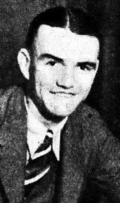Sammy Clarke
| Sammy Clarke | |||
|---|---|---|---|
 |
|||
| Personal information | |||
| Full name | Sydney Campbell Clarke | ||
| Date of birth | 5 April 1914 | ||
| Place of birth | West Midland, Western Australia | ||
| Date of death | 24 January 1945 (aged 30) | ||
| Place of death | New Guinea | ||
| Original team(s) | Hale School | ||
| Height / weight | 187 cm | ||
| Position(s) | Centre half-back, half-back flanker | ||
| Playing career1 | |||
| Years | Club | Games (Goals) | |
| 1933–41 | Claremont | 133 (6) | |
| Representative team honours | |||
| Years | Team | Games (Goals) | |
| 1934–37 | Western Australia | 8 (0) | |
|
1 Playing statistics correct to the end of 1941.
|
|||
| Career highlights | |||
|
|||
Sydney Campbell "Sammy" Clarke (5 April 1914 – 24 January 1945) was an Australian rules footballer and flying officer who was killed in the Second World War. From Perth, Western Australia, he attended Perth Boys' School and Hale School, representing Western Australia at schoolboy football, before being recruited to the Claremont-Cottesloe Football Club in the Western Australian National Football League (WANFL) for the 1933 season. Clarke won the Sandover Medal in his first season in the WANFL, and again won in 1934, to be the first back-to-back winner of the award. In total, he played 133 games for the club between 1933 and 1941, including the 1939 premiership, as well as representing Western Australia in eight interstate matches. Clarke enlisted in the Royal Australian Air Force in 1942, and was recorded as missing in operations, presumed dead, near Tadji, New Guinea, in 1945. He was posthumously inducted into the West Australian Football Hall of Fame in 2005, and the Western Australian Hall of Champions in 2009.
Clarke was born in West Midland (now Woodbridge), Western Australia, on 5 April 1914. His father, Sydney Clarke, Sr., played football for West Adelaide in the South Australian Football Association (SAFA) and Railways in the Goldfields Football Association (GFA). Clarke attended Perth Boys' School and Hale School, and captained the Western Australian schoolboys' side at the 1928 National Carnival in Brisbane, and Hale School's First XVIII in 1930. Clarke played for the Pastimes Football Club (now the Carey Park Football Club) in the Bunbury district football competition in 1931, before returning to Perth in 1932 to play for Nedlands in the Metropolitan Junior Football Association. He captained the club to the 1932 premiership, and also won the Strempel Medal for the best player in that competition. Clarke was recruited to Claremont-Cottesloe for the 1933 season, having been considered one of the best juniors in Western Australia the previous season. Clarke had an outstanding season, winning the Sandover Medal for the fairest and best player in the competition, despite his club winning the wooden spoon that season. He again won the medal in 1934, becoming the first back-to-back winner of the award. He missed the 1938 premiership win while undergoing training in England with the Royal Air Force (RAF), having worked his way overseas and back on a freighter. Clarke also represented Western Australia eight times, captaining the side against South Australia at Leederville Oval in 1934, and playing two matches at the 1937 Australian National Football Carnival, held in Perth.
...
Wikipedia
